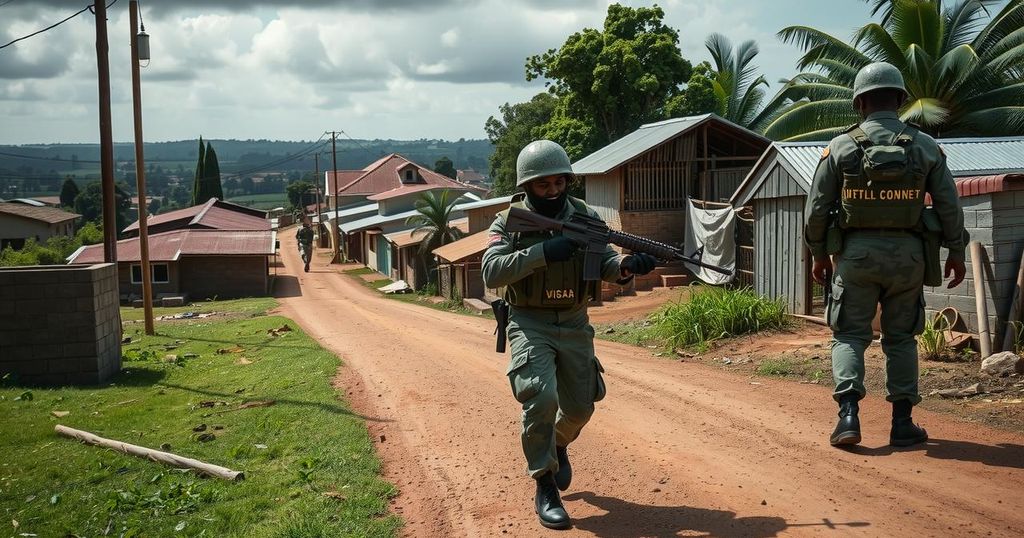Rwanda-Backed Rebels Capture Masisi in DR Congo’s North Kivu Province

Rwanda-backed rebels, specifically the M23 group, have captured the town of Masisi in DR Congo’s North Kivu province, marking the second town acquired in two days. This resurgence of conflict has raised humanitarian concerns, igniting fears of further instability as the M23 has already displaced hundreds of thousands since 2021. In the face of stalled diplomatic efforts between Congo and Rwanda, the humanitarian situation remains dire.
Rebel groups supported by Rwanda have overtaken the town of Masisi in eastern Democratic Republic of Congo (DR Congo), as cited by multiple reports. This event marks the second capture by the M23 group in the past two days within the mineral-abundant North Kivu province. Since 2021, the M23 has gained control over significant portions of eastern DR Congo, displacing hundreds of thousands of individuals. Efforts by Angola to facilitate dialogue between DR Congo’s President Félix Tshisekedi and Rwandan President Paul Kagame have faltered after previous negotiations collapsed last month.
Alexis Bahunga, a member of the North Kivu provincial assembly, expressed grave concern, stating, “It is with dismay that we learn of the capture of Masisi centre by the M23,” warning that this shift would exacerbate the humanitarian crisis in the region. Furthermore, a local resident relayed that the M23 had addressed the community, proclaiming their intent to “liberate the country.” Thus far, the Congolese government has not publicly responded to the loss of Masisi, which has an approximate population of 40,000 and is the administrative capital of its territory, located 80 kilometers north of the provincial capital Goma. Just a day prior, the rebels had also seized the nearby town of Katale, reigniting fears of a march towards Goma, a city that previously faced occupation by the M23 in 2012.
Following a period of decreased violence, fighting resumed in early December. In July, Rwanda acknowledged a United Nations report indicating the presence of around 4,000 Rwandan troops aligned with the M23. Rwanda has criticized the Congolese government for ineffectiveness in addressing long-standing conflicts in the eastern regions, alleging connections with individuals involved in the tragic events of the 1994 Rwandan genocide against Tutsis and moderate Hutus. Formed initially as a branch of another rebel faction, the M23 emerged in 2012 under the pretext of defending the Tutsi minority, who have historically faced discrimination. Critics of Rwanda contend that the government’s support for the M23 aims to exploit the region’s mineral wealth, consisting of gold, cobalt, and tantalum utilized in mobile phone and electric vehicle battery production. The Congolese government recently announced legal action against Apple regarding the exploitation of these so-called “blood minerals,” which prompted the tech company to declare an end to its sourcing from DR Congo.
The ongoing conflict in the eastern Democratic Republic of Congo has persisted for decades, driven by a complex interplay of historical grievances, ethnic tensions, and competition over natural resources. The M23 group, initially rising to prominence in 2012, claims to protect the Tutsi minority and address the long-standing inequalities they face. However, its operations have resulted in large-scale violence and displacement, exacerbating the humanitarian situation in the region. Despite attempts to mediate peace through diplomatic channels, including Angola’s efforts to foster dialogue between Congolese and Rwandan leaders, meaningful progress has been elusive. This strategic area is rich in resources but remains plagued by instability, with international stakeholders remaining concerned over the involvement of external actors like Rwanda.
The recent seizure of Masisi by Rwanda-backed rebels illustrates the persisting instability and humanitarian crises facing eastern DR Congo. The M23’s rapid advances highlight ongoing tensions in a region rich in resources yet fraught with violence. Diplomatic efforts to broker peace have thus far failed, leaving local populations vulnerable to the tumultuous actions of rebel forces. The international community, alongside the Congolese government, must navigate these complex issues to alleviate the suffering of affected civilians and work toward sustainable solutions.
Original Source: www.bbc.co.uk








